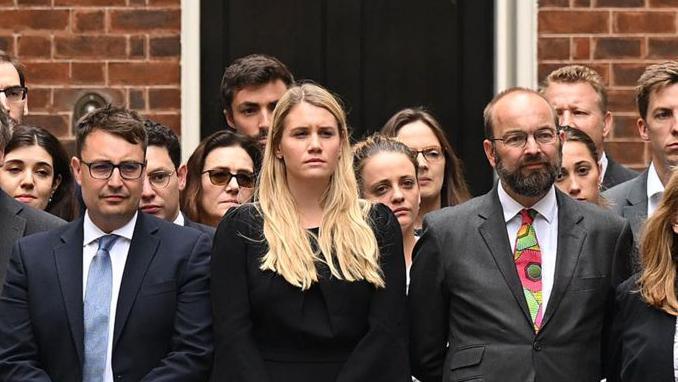Johnson attacks 'shameful' treatment of Charlotte Owen
Fiery exchange as Boris Johnson asked if he is a 'liar'
- Published
Former Prime Minister Boris Johnson has described the treatment of Charlotte Owen, a former adviser who he appointed to the House of Lords, as "absolutely shameful" and sexist.
Speaking to Matt Chorley on BBC Radio 5Live, he said the Lords had been "rammed to the gills" with political advisers who had not received similar levels of "abuse".
Owen became the youngest person ever to receive a life peerage, at the age of 29, after just six years at Westminster in relatively junior roles.
Johnson hit back at critics of the move, saying she had been an "extremely effective" political adviser.
He added that events in his political career had "fried the brains of a lot of people who opposed me and who opposed Brexit" adding: "We all need to get over it and move on."
Another Johnson adviser, Ross Kempsell, who is a year older than Owen, was also given a peerage.
Since joining the House of Lords, Owen has spoken in the chamber about topics including drink-spiking, housing targets and the import of fur.
She has also been made vice president of Boris Johnson's new company Better Earth, a sustainability consultancy.
Profile: Charlotte Owen
- Attribution
Ex-Johnson adviser joins Lords as youngest peer
- Published24 July 2023
Boris Johnson: Final curtain on a dramatic career?
- Published15 June 2023
Johnson became prime minister in July 2019 and served for three years until he was forced out by his own MPs.
In a live 30-minute interview, he addressed mistakes in his premiership, rejected claims of being unserious and touched on his future political ambitions.
Asked whose fault it was that he was no longer prime minister, he said "the awful truth is the large share of the responsibility is, of course, mine" but added that there were "other factors".
Specifically, he said a bid to overturn the suspension of Owen Paterson, a Conservative MP who broke parliamentary lobbying rules, was something he came to "greatly regret".
Responding to accusations of not being serious about the job of prime minister, he said his government had defeated Jeremy Corbyn's "semi-Marxist" Labour Party, delivered Brexit and overseen the rollout of the Covid vaccine.
"Nobody can say we were not serious in our approach," he said.
However, he defended the tone he sometimes used, saying: "There is no earthly point in expecting people to listen and understand what your political message is unless you try to interest them as well."

Charlotte Owen in Downing Street with allies of Boris Johnson as he announces his resignation
Johnson, a key leave campaigner in the 2016 EU referendum, also defended the Brexit deal he delivered as prime minister adding: “There’s no point in doing Brexit unless you’re actually going to take back control.
He acknowledged some of his own concerns, saying: “I worry about the politics sometimes of not being as close to our EU partners as we used to be, and people's feelings of upset in this country – people were very upset about it. I worry about that”.
He criticised the Conservative government at the time of the referendum, led by David Cameron, for not planning for Brexit.
"What happened was that in June 2016 the then-Prime Minister David Cameron evaporated, whistling, and then we had a devil of a job."
Challenged on a decision, detailed in his memoir, to present US President Joe Biden with a picture printed out from a Wikipedia image, Johnson said British taxpayers would be “grateful for the fact that we weren't lavishing money unnecessarily on gifts”.
Asked if he might return to Downing Street as prime minister in the future, he said there was a greater chance of being "blinded by a champagne cork" - a phrase similar to one he used when asked about his political ambitions before getting to Downing Street.